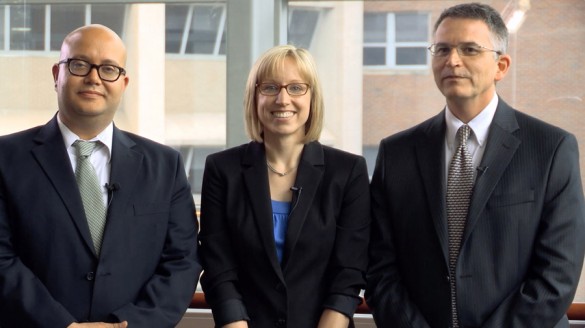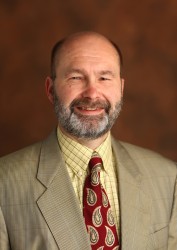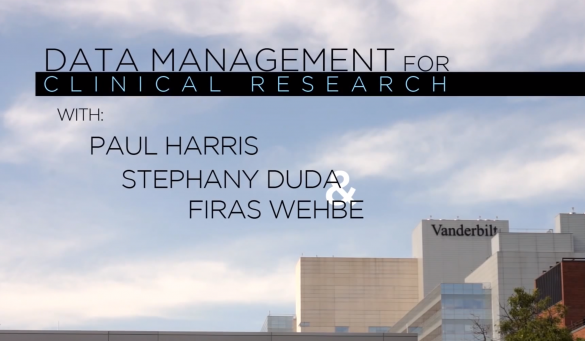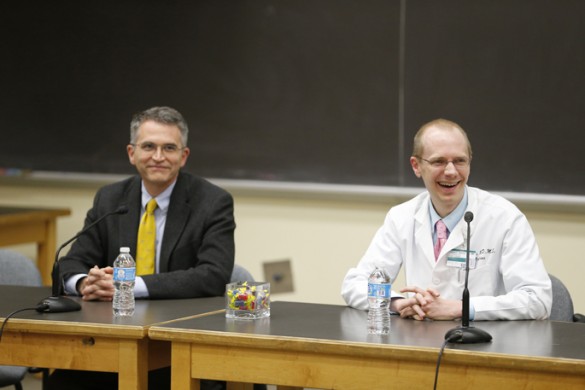
More than 4,700 students from around the globe have received certificates from Vanderbilt’s free five-week Data Management for Clinical Research course, taught online by Paul Harris, Ph.D., Stephany Duda, Ph.D., and Firas Wehbe, M.D., Ph.D.
The massive open online course, or MOOC, is offered through Coursera.
A multicolored world map shows where this MOOC’s students live. The U.S. is bright crimson, indicating the greatest number of students; India and Canada are almost as red; Australia, Spain and the U.K. are a bit more pale, followed by Brazil and Nigeria. Only a small handful of the world’s countries are left blank.
“After our first course offering in 2013, I did some back-of-the-envelope calculations and realized that in one five-week session we had taught the same number of students as we might otherwise instruct over the course of 100 years using traditional classroom methods,” said Harris, professor of Biomedical Informatics and research associate professor of Biomedical Engineering.
A student in Mexico recently contributed some personal news to the course’s online forum.
“Two weeks ago I got a job offering from one of the top global contract research organizations. Now I’m a proud member of the data management team. And I’m pretty sure that attending this course gave me the upper hand during the job interviews.”
Wehbe, assistant professor of Biomedical Informatics, isn’t sure how best to quantify the course’s overall impact, “but this one anecdote is poignant,” he said.
Harris describes it as a survey course for anyone engaged in clinical research.
“Researchers may have a great hypothesis, but if they do not plan and execute carefully when collecting and managing study data, maximal scientific benefit and impact will not be achieved. We have seen in our work that great research teams include all members of their team in planning for data capture, collection and management.
“We created our course so that anyone, regardless of their research role or medical domain interest area, can learn foundational best practices and come away with skills necessary to apply best practices in the real world,” Harris said.
Vanderbilt’s initial MOOCs were launched on Coursera in 2013, and 14 courses from the University are currently listed. The Vanderbilt Institute for Digital Learning helps faculty produce online courses.

The director, Douglas Fisher, Ph.D., M.S., said faculty typically approach his group as they’re preparing proposals for government agencies, private foundations or corporations.
“They’ll start a conversation with us about their ideas for an online course, as an education component of a research or training grant. We’ll commit based on the qualities that we see in those proposals, plus our own potential workload, and we’ll write a letter of support that we hope will strengthen the proposal.
“If any of the review panelists are aware of the workload and infrastructure it takes to do an open online course, they’ll balk unless they see a letter of support from us committing to the project,” said Fisher, associate professor of Computer Science and Computer Engineering.
He adds that extramural funding isn’t necessarily a requirement, and points out that many of the initial courses were launched entirely with Vanderbilt funding, and this practice will continue for many selected courses.
Harris, Duda and Wehbe together put in less than 40 hours of work last fall delivering the third offering of the data management course. But initially putting the course together required months of preparation.
“Preparing 10-minute videos for Coursera is completely different from classroom teaching,” Duda said. “Your existing material has to be reworked into short and thoroughly referenced information nuggets. We spent a lot of time proofing our slides for image copyright issues, checking for idioms that might not make sense to an international audience, and scrambling our usual teaching vignettes so we didn’t inadvertently offend someone familiar with the original event.
“But the nice thing is it’s gotten easier with every iteration of the course, and we’ve been able to contribute something meaningful for thousands of students.”
She said volunteers from across the research data management community have supported the MOOC by answering student questions on the course’s online forum.
Fisher notes that MOOCs aren’t the only worthy vehicle for higher online learning. His office is also available to assist faculty with smaller projects of all sorts.
“I’d like to see all or most faculty at Vanderbilt become producers of online videos at some level, featuring high quality but focused content. That could really gain attention for our institution,” he said.
For more information visit the Vanderbilt Institute for Digital Learning at www.vanderbilt.edu/vidl.















